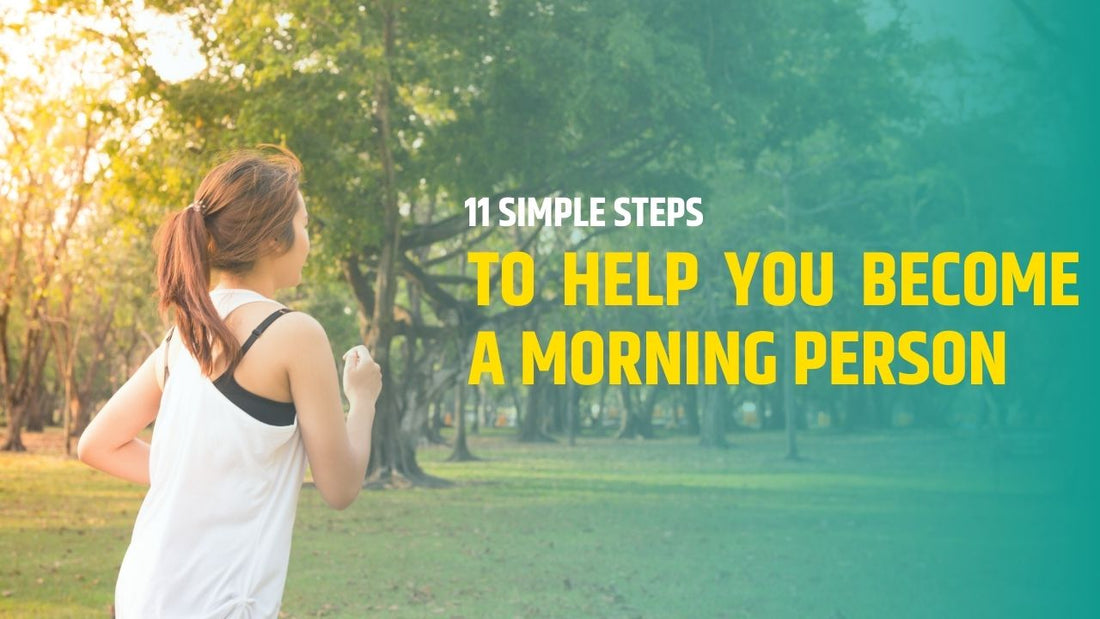11 Simple Steps To Help You Become A Morning Person And Enjoy It!

Key points
- Chronotype is a term used to describe a person's natural tendency to be awake or asleep and can impact mood and productivity.
- Lack of sleep can lead to negative effects on health, including weight gain, stress, and poor mental health.
- People who wake up early are typically more productive and practical than those who stay up late.
- Strategies for becoming a morning person include adjusting sleep habits, setting the alarm correctly, and finding a bedtime routine that works.
If you're like most people, you prioritise your work over sleep. But did you know that lack of sleep can lead to many problems, including weight gain, stress, and even poor mental health? Yes, you heard us right! Staying up late at night thinking the quiet atmosphere will help you to get more work done is a common misconception. It affects the body's natural sleep-wake cycle, mental health, and energy levels the next day. If you intend on pulling all-nighters regularly, you are at a greater risk of developing sleep disorders and major long-term health concerns.
Even if you need a few extra hours in the night to finish work, study, or simply want to binge-watch your favourite TV show, staying up is not always a wise decision. Your body is not a machine that can operate indefinitely. Waking up early after a full night's sleep, on the other hand, can help you make more proactive and sensible judgments, which are vital for your productivity. A recent study by Harvard Biologist Christopher Randler found that people who wake up early are more efficient and practical than those who stay up late.
In fact, most accomplished leaders begin their days by rising early. For example, Apple's CEO Tim Cook begins his day at 4 am reading important emails, and Michelle Obama rises at 4:30 am to exercise. They understand the value of having a clear and energised mind, which begins with a good night's sleep.
With a hectic lifestyle, waking up early and keeping a regular sleep schedule is difficult. And, if you're like most people, getting out of bed is the most difficult aspect of the day. You're tired, have no energy, and want to burrow under the blankets and hide. However, if followed regularly, a few things may transform you from a tired zombie to a well-rested human in no time.
In this blog post, we'll go through the steps you need to take, from adjusting your sleeping habits to properly setting your alarm clock. So let's get started!
What is chronotype?
First things first, it is important to understand what a chronotype is. It is used to describe someone's natural tendency to be awake or asleep. Our body naturally cycles through phases of wakefulness and sleep, which can affect our mood and productivity.
There are two main chronotypes: morning people and night owls. Morning people are typically more energetic, while night owls are more productive at night. However, a few people also fall between the two extremes.
In general, everyone needs to find their own rhythm to not feel rushed throughout the day or overwhelmed by feelings of fatigue. Understanding your chronotype can help you decide better when and how much sleep you need each night.
There is little question that heredity significantly impacts how people sleep and wake up. However, you may alter your sleeping and waking cycles, even if the changes are temporary.
Why should you try to become a morning person?
There is a lot of scientific data to back up the assumption that getting up early is beneficial for your general health. People who rise early in the morning are usually happier and have more energy than those who get up late in the afternoon or evening.

They also tend to be healthier, leaner, and wealthier because they use their time more efficiently. Here are five reasons why you should become a morning person:
- Be more productive: Morning people are typically more productive throughout the day because they are more energetic.
- Use your time more efficiently: If you wake up early, you are less likely to be interrupted by other activities and tend to have fewer distractions, which makes you more efficient at work.
- Have more time for family: Morning people have more time for family and friends because they are not rushed. They have enough time to arrange their day and are not forced to do things they would prefer not to do.
- Feel happier: Early risers generally report being happier than those who sleep late.
- Make healthier food choices: Getting up earlier allows you to prepare meals and eat at a leisurely pace. The most crucial thing is that you do not skip breakfast, the day's most important meal.
The above-stated are just a few of the benefits of becoming an early riser. Developing a morning routine is time-consuming and tough, but it is worthwhile if you want to be happier, healthier, and more productive.
How can you change your chronotype and become a morning person?
It is beneficial to become a morning person if you need to wake up for work, school, or another important activity. But if you're looking to wake up early, it is important to sleep right. And that's where having a healthy sleep routine comes in. On average, adults need around seven hours of sleep per night (but this varies depending on age, sex, etc.).
So, are you ready to begin? Follow these guidelines to wake up like a pro.
1. Use B・SYNC ON wake-up capsules
If you want to truly shine when you rise, then using B・SYNC ON capsules is the perfect solution. Waking up is one thing but having a better mood and more energy that will carry you through your day is another story!
B・SYNC ON capsules are designed to help you wake up feeling refreshed and motivated. They contain natural components such as vitamin B5, vitamin B12, zinc, and caffeine, which give you the edge you need to get your day started correctly. Plus, they're easy to take–just pop one into your mouth before bedtime, and the pill will start releasing active components in 7 hours, waking you up gently and naturally. Thus, the capsules wait until you've had a full night's sleep before releasing revitalising nutrients when you're about to get up. They've also been clinically evaluated, so you know they're effective and safe. If you want to kickstart your morning like a pro, reach for a packet of B・SYNC ON capsules. Shop now!
2. Go to bed earlier
If you want to become a morning person, going to bed earlier is one of the most important steps. You should avoid spending your evenings binge-watching Netflix or partying until the wee hours of the morning.
So how late is too late?
Experts generally recommend going to bed no later than 10 pm or 11 pm. This way, you'll get enough rest but won't be so cranky in the morning that you can't function effectively.
If you are already sleeping late, try going to bed 15 mins earlier every day until you hit a sleep schedule that works for you. Once you've settled on a bedtime, stick to it without fail so your body knows when it's time to wind down.
3. Use an alarm clock and locate it smartly
Using an alarm clock to wake you up is a good idea, but make sure you choose the right one. A standard alarm clock will beep loudly and jolt you out of bed, which can be annoying and disruptive. Ideally, you want an alarm that goes off softly so it wakes you up peacefully.
Also, keep the alarm clock farther away from your bed. This will ensure you get up to turn it off. This way, you won't be tempted to hit snooze and oversleep in the morning. But make sure it is not too far that you would not hear it.
4. Avoid using electronics before bed

Using devices like smartphones, computers, or tablets just before you plan on sleeping is one of the most common things that can disturb your sleep pattern. It's difficult to resist the temptation to check social media or watch a hilarious YouTube video before bedtime, but doing so would only keep you up all night.
Studies have shown that using gadgets in a dark room before bed can cause your brain to stop producing the sleep hormone called melatonin. This hormone is responsible for the drowsy feeling we experience before bedtime. Therefore it is very important to dim all the lights or switch them off before stepping into bed.
Instead of using electronics hours before sleeping, try taking a few minutes to relax, read your favourite book, or listen to calming music. This will assist you in getting a stress-free night's sleep, allowing you to wake up early and feel energised.
5. Reduce stress before bed
Another common habit that can spoil your sleep and cause you to wake late is stressing out about things that don't matter. For example, if you're anxious about a test tomorrow or juggling work and home duties, your body and mind might get stressed, making it difficult to fall asleep.
Taking some time for yourself before bed might help lessen anxiety. You should engage in calming activities such as yoga, massages, meditation, deep breathing or journaling your thoughts and emotions.
With these tactics, you'll sleep like a baby and wake up refreshed and ready to take on the day. You'll also find that you're calmer and more capable of dealing with daily pressures.
[https://www.youtube.com/watch?v=x9fVKujpzdY ]
6. Do not skip breakfast

Many people skip breakfast, thinking it wastes time and is unnecessary. But that's not the case. It is considered one of the most essential aspects of becoming a morning person. Skipping breakfast can actually lead to increased fatigue and an overall feeling of despair in the morning. If you don't eat before lunchtime, your stomach will feel empty, and cravings may intensify later in the day. Sooner or later, those cravings will turn into unhealthy food choices heavy in sugar, keeping you up at night.
As a result, eating breakfast before getting ready for work or school ensures that your body has enough energy and nourishment to perform well. A well-balanced breakfast with protein, carbs, and healthy fats is a smart choice.
7. Skip unnecessary daytime naps
There's a lot of debate surrounding daytime naps. Some claim they help improve cognitive function and concentration, but most experts believe they are unnecessary.
Often, the busiest days are also the ones that end with the most stress. Generally, by mid-afternoon, you may become mentally and physically exhausted from all the work done during the day. A nap may make you feel alert and refreshed, but it will disrupt the natural process of falling asleep. Frequently taking naps during the day makes it harder to get knockout slumber at night. Thus pushing your wake-up time to much later.
Instead of taking a short nap in the afternoon or evening, try winding down for 15 to 30 minutes by taking a leisurely walk, reading a book, or watching some calming videos. This will assist you in relaxing and calming your mind. These breaks at regular intervals throughout the day can help you overcome the urge to nap.
8. Exercise is a great way to kick off your day
Starting your day with some physical activity can help you become a more morning person. Exercise causes the production of endorphins, which are hormone-like compounds that make you feel happy. These happy sensations pervade your day and make it easier to approach tasks positively.
In addition, morning exercise has been shown to improve moods and energy levels throughout the day. By working out early in the morning, you will have an energetic and focused start to each day!
9. Fast before bedtime
Your internal clock regulates your daily activities, such as sleeping and eating. In fact, your circadian rhythm - or the natural cycle of day and night - is largely determined by how you eat and digest food. Whenever you consume food, your body understands that it's time to digest it and works to break it down into individual nutrients. Thus keeping the body internally awake.
Fasting puts your body on standby mode. Moreover, it is a natural part of sleep and regeneration. When you fast, your body can still access energy from the food you ate earlier in the day. This allows your body to function at its peak performance and ensure optimal health.
There are many different types of fasting, each with its own benefits. The most common type is the 16/8 intermittent fast or time-restricted feeding, where you have an 8-hour eating window followed by 16 hours without food. Time-restricted feeding also has other benefits, such as weight loss, increased insulin sensitivity, and lower inflammation, which can help improve your general health and make you a better morning person!
10. Create a comfortable sleeping environment
Waking up early is impossible without a peaceful and quiet bedroom environment. Your room's ambience greatly impacts how quickly you can fall asleep and get into a deep sleep cycle.
Invest in a good mattress that is firm but not too hard. Also, get a supportive pillow that will contour your head and neck to align your spine while sleeping.
You should also ensure that no noises disturb your sleep. While sleeping, your brain is still processing information, so noises like a barking dog or loud snoring might interrupt your slumber and keep you awake. Also, before bed, put your smartphone on mute or aeroplane mode.
However, some sounds are known to encourage sleep. White noise from a fan, air conditioner, or humidifier, for example, can assist in filtering out other noises and provide a relaxing environment for sleep. We recommend using earplugs if you have a loud neighbourhood or live close to the metro/ airport.
11. Make your bed immediately after waking

Making your bed is one of the easiest yet most powerful things you can do to begin your daily routine. It sends a positive signal to yourself that you are taking care of things and are one step closer to effectively completing your day.
In addition, making your bed can reduce stress levels and increases self-esteem. So why not take it up as a challenge? Like most people, you probably don't make your bed at least half the time. That's okay - from now on, challenge yourself to start making your bed every morning!
Final Thoughts
You now have the keys to having a better night's sleep and becoming a morning person thanks to these insights and supplements like B・SYNC ON. Of course, the journey will not be simple and require you to be consistent and take things one step at a time. But it will be worth it once you start seeing the positive changes in your life.
FAQs
What must you do to become a morning person?
One of the best ways to become a morning person is to establish early-morning rituals. This could involve anything from waking up at the same time every day, eating breakfast before bed, and keeping your bedroom dark and quiet until you wake up. By doing these things consistently, you can help train your body and mind to get ready for the day ahead.
What are the benefits of being a morning person?
By waking up early, you're more likely to have enough time for breakfast and start the day off on an energetic note. This also gives you more time to focus on healthy goals during the day rather than running around trying to meet everyone's demands.
How to wake up early in the morning without an alarm?
Initially, an alarm would be required. Set it at the same time every day, and make sure you don't press snooze. Once your body has established a regular cycle, your eyes will open naturally at the same time.







